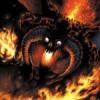
Can You Ever Really Erase a Computer File?
#16

 Posted 13 August 2005 - 01:47 PM
Posted 13 August 2005 - 01:47 PM

#17

 Posted 13 August 2005 - 07:23 PM
Posted 13 August 2005 - 07:23 PM

#18

 Posted 13 August 2005 - 08:32 PM
Posted 13 August 2005 - 08:32 PM

Edit: another thing you could do is take a propane torch and put the heat on it long enough to melt the plastic. once it's soft enough, take a pair of pliers and bend the disk in half with the data side facing in, then apply more heat and fuse the two halfs together.
The only people that would be able to use the information from disks mutilated like that would be teh crime labs, so if you are worried about covering up illegal information, this won't work to save you.
Edited by Efwis, 13 August 2005 - 08:36 PM.
#19

 Posted 15 August 2005 - 06:44 AM
Posted 15 August 2005 - 06:44 AM

#20

 Posted 15 August 2005 - 07:51 AM
Posted 15 August 2005 - 07:51 AM

For hard drives, I have a pretty good way of destroying the data. Ive done this with all my old drives.
First I shoot the hard drive a minimum of 5 times with a large caliber rifle (Target practice (.300 Ultra Mag should do)). Then I soak the drive in salt water for about a week. After all this is said and done, I take the drive to a private lake and drop it in the deepest part of the lake (if the 15' of water doesnt lose it, the 10' of muck will).
ScHwErV
#21

 Posted 16 August 2005 - 06:20 PM
Posted 16 August 2005 - 06:20 PM

You can find many wonderful free programs at Snapfiles, and it is very well organized. You can find many different data wiper programs there. Or you can blow a hole in everything, like ScHwErV suggests.
#22

 Posted 19 August 2005 - 12:33 PM
Posted 19 August 2005 - 12:33 PM

please answer
#23

 Posted 19 August 2005 - 03:18 PM
Posted 19 August 2005 - 03:18 PM

2. Open the computer up
3. Find the hard drive and unscrew it from where it's attached.
4. Unplug the power cable and the data cable.
There you go. Depending on the manufacturer, the hard drive may be in a metal rack that you can pull out or unscrew out.
As for burning it, it's just one method of making sure all data is destroyed and unrecoverable. That way thieves can't steal sensitive data.
Edited by computerwiz12890, 19 August 2005 - 03:19 PM.
#24

 Posted 20 August 2005 - 02:58 AM
Posted 20 August 2005 - 02:58 AM

#25

 Posted 20 August 2005 - 05:12 AM
Posted 20 August 2005 - 05:12 AM

Not likely thought it is kind of ovious what to do when the computer is open.
#26

 Posted 20 August 2005 - 09:54 AM
Posted 20 August 2005 - 09:54 AM

#27

 Posted 20 August 2005 - 11:50 AM
Posted 20 August 2005 - 11:50 AM

I once added a new printer to a computer, and it wrecked my word processing program. I spent more than forty hours reinstalling my word processor several times (22 3.5 inch floppy diskettes) before I finally gave up on it and bought another computer. (it was probably a case of DLL mismatch more common in the mid 90's)
In any case, if you are doing anything important on a computer, you really should have two similar computers so when one breaks (hardware/software) you have another one to carry on with. When you get to that point, then opening up your computer isn't that risky. Its even fun.
As far as people worrrying about their hard drive data: People will have their banking records on their computer, emails, pictures etc, and they worry that rotten people will use that information to harm them. It has happened before and made the news, but then again most of the time the news focuses on the rare and unusual.
my 02 cents worth
EMCguy
#28

 Posted 20 August 2005 - 01:17 PM
Posted 20 August 2005 - 01:17 PM

1. Unplug the computer from its power supply.
2. Open the computer up
3. Find the hard drive and unscrew it from where it's attached.
4. Unplug the power cable and the data cable.
There you go. Depending on the manufacturer, the hard drive may be in a metal rack that you can pull out or unscrew out.
As for burning it, it's just one method of making sure all data is destroyed and unrecoverable. That way thieves can't steal sensitive data.
And dont forget ESD precautions while you have it open.
EMCguy
#29

 Posted 20 August 2005 - 04:54 PM
Posted 20 August 2005 - 04:54 PM

#30

 Posted 20 August 2005 - 07:00 PM
Posted 20 August 2005 - 07:00 PM

Similar Topics
0 user(s) are reading this topic
0 members, 0 guests, 0 anonymous users
As Featured On:






















 Sign In
Sign In Create Account
Create Account

